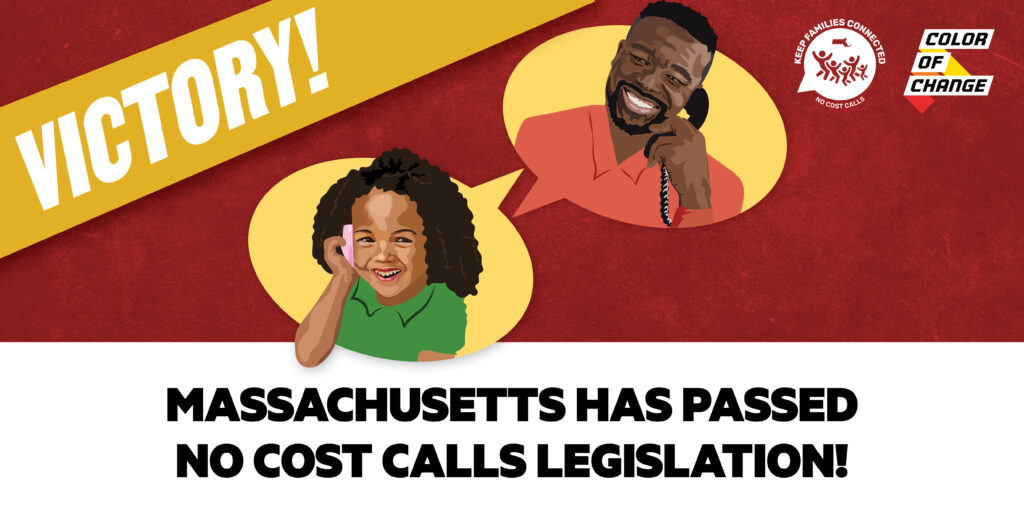COC efforts help gain free phone calls for imprisoned people in Massachusetts

By Color Of Change staff
Beginning Dec. 1, people incarcerated in Massachusetts jails and prisons will be able to communicate with their loved ones at no cost, thanks to the efforts of a coalition of advocates including Color Of Change.
The bill signed into law Nov. 16 by Massachusetts Gov. Maura Healey makes phone calls, video calls and emails free for the more than 12,300 individuals currently in state prisons and county jails in the commonwealth.
The change is a victory for Color Of Change members and the Keeping Families Connected/No Cost Calls Coalition, which pushed Massachusetts lawmakers to lessen the financial burden on incarcerated people and their families to stay in touch. Telecommunications companies have raked in billions of dollars nationwide by charging as much as $1 per minute for people behind bars to call their loved ones.
In addition to putting the squeeze on cash-strapped incarcerated people and their families, many of whom are low-income, the price-gouging companies are harming more than just household budgets. Studies show that incarcerated people who lose contact with loved ones are more likely to reoffend after release and wind up back in prison.
“Ensuring that individuals in state and county prisons can keep in contact with their loved ones is key to enhancing rehabilitation, reducing recidivism and improving community safety,” Gov. Healey said in a statement after signing the legislation. “I’m proud to sign this important legislation and grateful to the Legislature and advocates for their partnership.”
Massachusetts is now the fifth state in the nation to make prison and jail calls free. But the change was a long time coming. Nia Reid-Patterson, a No Cost Calls Coalition member, and her family have been advocating for free calls for more than six years.
“It feels like a boulder has been lifted off my chest,” said Reid-Patterson, whose family has been impacted by the burden of these fees. “Like many other families, making the choice between paying for calls to keep our families connected and groceries has been nothing short of cruelty from predatory prison phone companies profiting from our already vulnerable families … It’s been a long journey, however, it’s not over. We will continue to push for the proper implementation of this legislation so our families can be connected with maximum access.”
The victory was lauded by incarcerated people, who also were active in the broad coalition pushing for the legislation.
“It’s been an uphill battle to say the least, but one worth fighting for,” said Will “7even” Ragland, chairman of the African American Coalition Committee composed of men incarcerated at Massachusetts Correctional Institution-Norfolk who are focused on reforming the criminal legal system. He said the AACC appreciates the benevolence of those who worked tirelessly for the legislation.
“Black and Brown people – many in poverty – make up 21% of the Massachusetts population, but roughly 60% of the prison and jail population,” Ragland said. “It is a monstrosity and repugnant. It’s not surprising then that Black and Brown people spend the most on phone calls, video calls and e-messages with their incarcerated loved ones to the tune of $25 million annually. Given our low prison wages, our families are often left with the bill, deciding whether to put money on their loved ones’ phone accounts or pay their rent, put gas in their cars or put food on their tables. This is all while prisons, jails and their telecom vendors rake in profits.”
Michael Collins, senior director of state and local government affairs at Color Of Change, said the new Massachusetts law marks a milestone in the movement to end the abusive power of prison profiteering.
“Financial exploitation in our carceral systems has created barriers for families and their loves to stay connected, for the sake of gains by the state and corporations,” Collins said. “The passage of this legislation in Massachusetts sets a national standard for human rights for incarcerated people, a standard we urge other states to follow.”
He said COC and its partners in this fight for civil rights “will continue to move forward a vision of a prison complex that puts first the humanity of incarcerated people.”
Massachusetts now joins Connecticut, California, Minnesota and Colorado in eliminating fees for phone calls for incarcerated people.
As advocates continue to push state-by-state for free prison calls, rates in most states now are regulated by the Federal Communications Commission. COC members were instrumental in the long push to enact federal legislation to eliminate predatory rates for phone calls from prisons and jails. The Martha Wright-Reed Just and Reasonable Communications Act of 2022, which President Joe Biden signed in early January 2023, allows the FCC to regulate the price of prison phone and video calls.
Federal regulations determining the price cap on phone calls are being drafted and may be in place as early as July 2024. Color Of Change is working with the national phone justice coalition to urge the FCC to act swiftly and in the best economic interest of impacted families.

